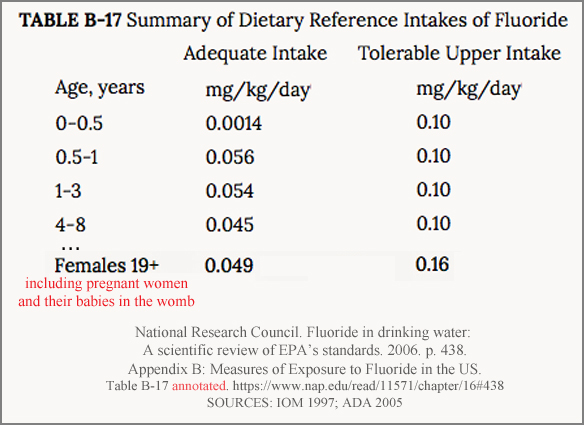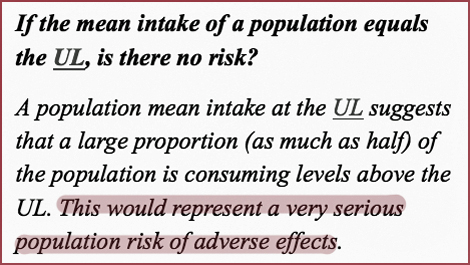|
Home Page
Known About Fluoride
Toothpaste Warning
Interferes with Brain
Fetal Vulnerability
Neurotoxicity
Genetic Factor
Needs to Be Known
Fetal Fluoride Intake
Fluoride Drugs
Amniotic Fluid
Bogus Sales Pitch
Oregon Deception
Crazy Advice
Premature Birth
Infants Overdosed
Infant Mortality
Life Decay
Mental Fluorosis
Fluoride and
Neurodegeneration
End Fluoridation
Save $Billions
Know News
Prenatal Microbiome
Fluoride & Obesity
Vascular Dementia
Arterial Stiffness
2019 Studies
Fluoridation 'Science'
CDC's Irrationale
EPA's Pollutant
PHS's Debunkery
The Book
Contents
Author
|
Fetal Fluoride Intake Levels Exceed Safety Thresholds
US Institute of Medicine (IOM)
IOM's "Adequate Intake" (AI) of fluoride for adult females is 0.049 mg/kg/day.
Based on their reference weight of 61 kg, that's 3.0 mg/day of fluoride:
the amount pregnant woman are recommended to consume.
Most fluoride intake is from fluoridated tap water,
which pregnant women are told to drink throughout the day,
especially between meals and snacks.
When a pregnant woman consumes fluoride, so does her baby.
"It is known that fluoride crosses the placenta,
enters the fetal circulation." (IOM p. 303)
This means for babies in the months before birth, their
daily AI of fluoride (0.049 mg/kg/day) is 35 times higher
than it is for babies in the months after birth (0.0014mg/kg/day).

See entire table
|
For children, their "Tolerable Upper Intake Level" (UL) of fluoride is 0.10 mg/kg/day.
For children in the womb, however, it would be "significantly lower" because
"sensitivity increases due to active placental transfer, accumulation of certain
nutrients in the amniotic fluid, rapid development of the brain."
– US Institute of Medicine (IOM) 1997
Despite this, the IOM made the UL for pregnant women and their
fetuses 0.16 mg/kg/day – 60% higher than the children's UL!
This suggests "A very serious population risk of adverse effects":

Some Frequently Asked Questions" (IOM 2000)
|
Dietary Reference Intakes for Calcium, Phosphorus, Magnesium,
Vitamin D, and Fluoride – US Institute of Medicine (IOM). 1997.
The Institute of Medicine Ignored Babies in the Womb
For calcium, phosphorus, magnesium and Vitamin D, the IOM gave considerable attention to pregnancy and fetuses. Not so for fluoride:
The IOM did not consider babies in the womb. Its only pregnancy concern for fluoride whether a mother-to-be needed more fluoride, not less:
"There is no evidence at this time that the AI for women during pregnancy should be increased above the level recommended for women during the nonpregnant state." (p. 305)
"No data indicate an increased susceptibility to fluorosis during pregnancy. Therefore, the UL for adults of 10 mg/day was also established for pregnant women." (p. 311)
Worse: unlike calcium, phosphorus, magnesium and vitamin D, fluoride is not an essential nutrient. "Fluoride has no known essential function in human growth and development." – European Food Safety Authority (2013)
|
|
Since 1997, Babies in the Womb Continue to be Ignored,
Despite Growing and Compelling Evidence from the EPA
In 2009, a team of researchers at the Neurotoxicology Division of the US Environmental Protection Agency identified 202 "developmental neurotoxicants," chemicals shown to be "toxic to the developing mammalian nervous system." They had "substantial evidence" for 107 of the chemicals – including fluoride, nicotine, thalidomide, cocaine, PCBs, amphetamine, bisphenol A, and LSD.
In 2015, that team identified 21 of these developmental neurotoxicants as the "gold standard," because they were "well documented to alter human neurodevelopment." Again fluoride is one of them – along with more substances pregnant women already should avoid: alcohol, lead, arsenic, chlorpyrifos, mercury, valproate, terbutaline.
Of all these developmental neurotoxicants,
fluoride is only one purposely added to drinking
water to treat people, including babies in the womb.
In 2020, EPA researchers reported that fluoride is the "toxic element" that has the "greatest increase in impacting cognitive ability' in children – 13 times the impact of exposure to lead.
– A meta-analysis of stressors from the total environment associated with children's general cognitive ability
|
Environmental influences during fetal development are especially potent in the brain, because "gestation is when differentiation of major brain structures occurs, thus creating greater sensitivity to environmental conditions... Even small deviations from the normal developmental trajectory during fetal life can become progressively magnified over time, producing long-lasting or permanent consequences." – The Dana Foundation (Organizer of Brain Awareness Week in 1996)
|
Evidence Presented at the 2020 Fluoridation Trial:
Food & Water Watch et al. v. Environmental Protection Agency
The protective blood brain barrier does
not finish developing until 6 months of age
"Passage of fluoride into the brain can be expected to be higher during the fetal and neonatal life stages when the blood brain barrier is not yet fully developed."
"Multiple converging lines of evidence support the fetal period as a critical period of susceptibility to fluoride's neurotoxic effects. First, it is well established that fluoride crosses the placenta and reaches the fetus. Second, due to the absence of an effective blood brain barrier, the fluoride that reaches the fetus also reaches the brain – a fact that has been confirmed by both animal and human studies."
– Expert Declaration of Kathleen M. Thiessen, PhD
(Pages 30 & 57)
|
Research shows that fluoride levels in fetal blood can be more than twice as high as cord blood and 25% higher than maternal levels. This happens because fluoride in amniotic fluid also enters into fetal circulation (like alcohol does).
Fluoridated Water:
From the Pharmacist, it has pregnancy and poison warnings;
from the Faucet, it has no warnings. – Fluoride Drugs
Fluoridation was implemented in the stone age of neuroscience.
'Health' authorities must stop discriminating against
and overdosing children in the womb
with a known neurotoxin!
This is a Human Rights Issue

|